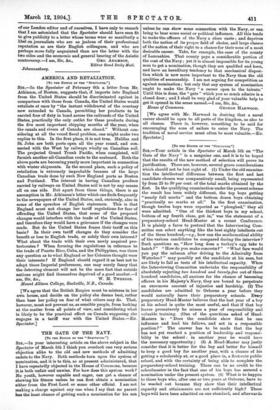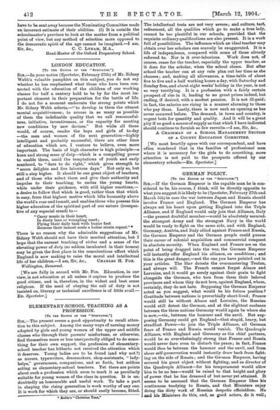[To THE EDITOR Or THE "SPEC r.crott."] SIR,—Your article in
the Spectator of March 5th on "The Gate of the Navy" is a sanguine one, and it is to be hoped that the results of the new method of selection will prove its justification. There are, however, several grave considerations which should not be lost sight of. (1) Under the old examina- tion the intellectual difference between the first and last candidate chosen was comparatively small, being represented by from 25 to 30 per cent. of the total marks obtained by the first. In the qualifying examination under the present scheme the result has been widely different, the top boys getting "nearly full marks" and the bottom dozen boys obtaining "practically no marks at all." In the first examination, though twelve boys were reported as "ploughed," they all were admitted. "One of the thickest boys in ray school, bottom of my fourth class, got in," was the statement of a preparatory-school Head-Master at a recent Conference. It is plainly a farce to pretend that the Interviewing Com- mittee can select anything like the best eighty intellects out of the three hundred,—e.g., how can the mathematical ability of the various candidates be compared during the interview ? Such questions as, "How long does a turkey's egg take to hatch?" "How do you make concrete P" "What fare would you pay the cabman after driving to the Admiralty from Waterloo ? " may possibly set the candidate at his ease, but are likely to fail as tests of his intellectual capacity. When the Interviewing Committee undertake the responsibility of absolutely rejecting two hundred and twenty-five out of three hundred candidates, all anxious for the chance of becoming officers in his Majesty's Navy, they are bound to perpetrate an enormous amount of injustice and hardship. (2) The candidates are admitted to Osborne a year before they would naturally leave their preparatory schools. Every preparatory Head-Master believes that the last year of a boy at his school is quite the most useful, and that if that boy leaves prematurely he misses a year of responsibility and valuable training. (One of the questions asked of Head. Masters is : "Does the candidate show that he can influence and lead his fellows, and act in a responsible position?" The answer has to be made that the boy has not yet reached a position of leadership and responsi- bility in the school : in another year he would have the necessary opportunity.) (3) A Head-Master may justly consider that it is better for the boy and better for himself to keep a good boy for another year, with a chance of his getting a scholarship at, or a good place in, a first-rate public school, and with the certainty of being able to complete the preparatory-school training. There can be no credit to the schoolmaster in the fact that one of his boys has secured a nomination under the present system. (4) What is to happen to those boys who, after one or two years at Osborne, have to be weeded out because they show that their intellectual capacity and attainments are not sufficiently high ? These boys will have been admitted on one standard, and afterwards have to be sent away because the Nominating Committee made an incorrect estimate of their abilities. (5) It is outside the schoolmaster's province to look at the matter from a political point of view, but any method of selection more opposed to the democratic spirit of the age cannot be imagined.—I am, Sir, &c., C. C. LYNAM, M.A., Head-Master of the Oxford Preparatory SchooL











































 Previous page
Previous page